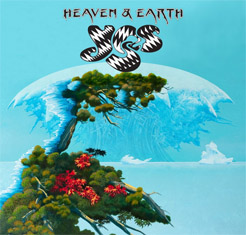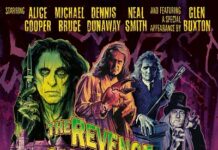In an age when making albums is a risky and unprofitable enterprise, Yes have defied the odds by unveiling Heaven & Earth, their 19th full-length studio release. The stakes are high for the veteran British group because the album features singer Jon Davison, on board for two years, making his first appearance on a Yes studio record. Surely, as with their last album, 2011’s Fly From Here, debuting then-new singer Benoit David, there will likely be a small cadre of naysayers who will boycott this album on the grounds that Jon Anderson isn’t on it. Those same people probably haven’t heard the painfully underrated Drama either.
From the outset, Heaven & Earth swims in lush, subtle production, courtesy of the renown Roy Thomas Baker, whose ability to apply broad strokes to the spread is what made Queen and the Cars sound so grand and epic — concepts Yes are only too familiar with. His presence is immediately felt as the elements coalesce cozily on “Believe Again.” Davison’s vocal is very much in the spirit of Jon Anderson as a stylish orchestration of strings and keys build around a plaintive, yearning lyric beaming with hope. Here and on much of the album, keyboardist Geoff Downes takes a dominate role, strategically loading layers of keyboards to wherever the melody springs. You might even hear traces of Rick Wakeman licks sprinkled about just to remind that this is indeed Yes. Tracks like “The Game,” “Step Beyond” and “In A World Of Our Own” have more in common with the poppy Big Generator than the proggy Tales Of Topographic Oceans, with Downes creating simple, melodic frameworks for the other players to ply. This is where Howe, bassist Chris Squire and drummer Alan White remain fairly laid back. But they get their chops in soon enough.
Light keys, a soft guitar line with crashing drums steer the ship on “Light Of Ages” before it blossoms into one of the album’s most elegant songs. Downes sows the piano line while Howe and Squire weave the twists and and turns for Davison’s smooth vocals to glide over. Howe gets in his best licks on “It Was All We Knew.” It’s not the kind of playing you heard on Fragile, but it works well for the song. These days, that sort of economy has its place, even in a Yes song. The final number on any Yes album is typically the most complex — “Subways” is no exception. The heavily orchestrated introduction segues into a light and suave tempo hat transforms into old school prog with Squire’s bass more or less defining the boundaries. Downes blasts off with a Hammond solo, followed closely by Howe’s sprite contribution. This certainly would be one to see them play live. Where Heaven & Earth lands in the Yes catalog is hard to say. You could say every Yes album has its highs and lows. You could say it’s foolish to even think they could make another Fragile, Close To The Edge or 90125. And you could also say getting a new Yes album with most all the trimmings in 2014 is a miracle unto itself. This one’s certainly enough to keep you hoping for more.
~ Shawn Perry




















